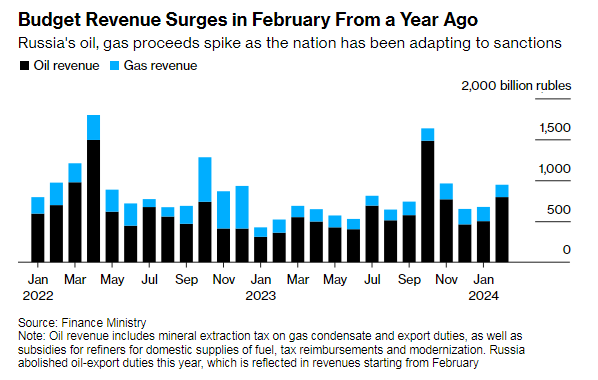
Russia’s oil and gas revenue jumped more than 80% in February from a year earlier to over $10 billion due to higher prices for the nation’s crude as its producers withstood Western sanctions, Bloomberg informs.
Budget proceeds from taxes on oil and gas totaled 945.6 billion rubles ($10.4 billion) last month, the Finance Ministry said. Levies on crude and petroleum products — which accounted for 84% of total hydrocarbon revenues — more than doubled, according to Bloomberg calculations based on the data.
The oil taxes were calculated using an average price of Urals — Russia’s main export blend — of $65 a barrel. That’s up from less than $50 a year ago.
To curb Russia’s oil revenues, Western nations imposed sanctions that pushed the price of Urals below $50 a barrel in February 2023.
Back then, the European Union banned most seaborne imports of crude and petroleum products from Russia, and the Group of Seven nations imposed a $60-a-barrel price cap on the country’s oil cargoes. While buyers from other countries have been free to buy Russian barrels at a higher price, they’re not allowed to use Western services like insurance and shipping for those supplies.
Moscow has limited the impact of the price cap by using a massive shadow fleet of tankers and working with non-Western buyers, intermediaries and service providers.
However, the US and its allies have since November toughened their monitoring of the price-cap compliance, imposing sanctions on several vessels and traders for violating the restrictions. The tougher stance has again widened Urals’s discount to the Brent benchmark.
But to shield cash flows to the budget, Russia has activated a so-called price floor mechanism, ordering producers to pay taxes based on an artificial $15-a-barrel discount for Urals to Brent. The budget received the money in February. The actual discount at which producers sold their Urals cargoes averaged more than $18 at Russian ports in January, according to data from Argus Media Ltd.
Since 2019, Russia gradually reduced export duties on crude and oil products and fully abolished them from this year. At the same time, authorities have raised the oil-extraction tax to compensate for the shortfall from export-duty revenues. As a result, Russia’s revenue from the oil-production tax hit the highest in almost two years.
Russia also paid 127.9 billion rubles of subsidies to its oil processors in February for domestic sales of diesel and gasoline, the ministry’s data show. The payments, which usually dent oil revenue, have partially compensated refiners for the gap between motor fuel prices in the local market and overseas.
read more in our Telegram-channel https://t.me/The_International_Affairs

 9:35 08.03.2024 •
9:35 08.03.2024 •






















